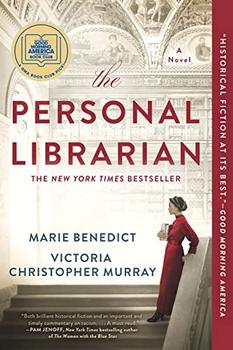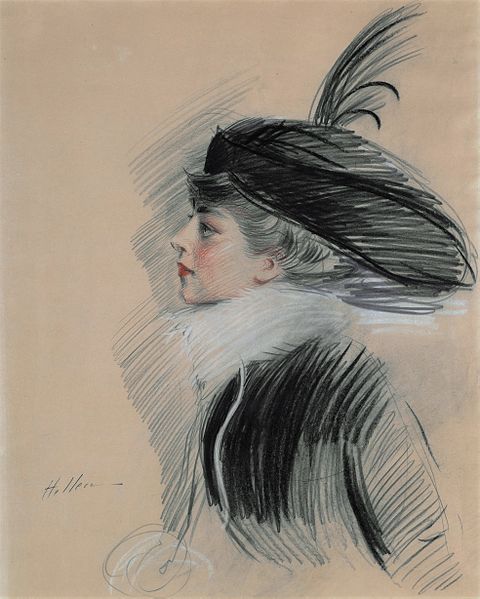Summary | Excerpt | Reading Guide | Reviews | Beyond the Book | Read-Alikes | Genres & Themes | Author Bio

This article relates to The Personal Librarian
 Belle da Costa Greene was an American librarian who ran the private library belonging to banker John Pierpont Morgan (better known as J.P. Morgan) and later to his son. During her time working for the Morgans, Greene acquired many rare books, manuscripts and other items for her employers, ultimately contributing to what is now an impressive public collection.
Belle da Costa Greene was an American librarian who ran the private library belonging to banker John Pierpont Morgan (better known as J.P. Morgan) and later to his son. During her time working for the Morgans, Greene acquired many rare books, manuscripts and other items for her employers, ultimately contributing to what is now an impressive public collection.
Born Belle Marion Greener in 1879, she grew up in Washington, D.C. Her father, Richard Theodore Greener, was the first Black man to graduate from Harvard University. Richard was a lawyer, an activist who wrote and spoke about issues facing Black Americans, and an enthusiastic reader and book collector. Belle's mother, Genevieve Ida Fleet, was a music teacher from a prominent Black family. Richard and Genevieve separated while Belle was still a child, due in part to stresses related to Richard's work. After their separation, Genevieve changed her children's and her own last name to Greene. At some point, Belle and her siblings added "da Costa" to the name and began to claim Portuguese ancestry. They and Genevieve were light-skinned enough to be able to pass for white — or at least as racially ambiguous — in Richard's absence.
Hiding her background opened up opportunities for Greene that likely would not have otherwise been available to her. She is thought to have studied library science, with records indicating a class taken at Amherst College, and eventually landed a job at the library at Princeton University. In 1905, she connected with J.P. Morgan through his nephew, Junius, who also worked at the Princeton library. Morgan hired Greene to run his personal Manhattan library on Junius's recommendation. She became responsible for managing the collection of rare books, manuscripts, artwork and other antiquities; organizing events; and interacting with dealers and experts for the purpose of acquiring new items. She remained the banker's personal librarian until his death in 1913, at which point she became librarian to his son, Jack. In 1924, Jack made the library public, and Greene continued as director there until retiring in 1948.
Greene was known for her flamboyant personality and style, sporting elegant gowns, pearls and plumed hats. According to HistoryNet, she was fond of saying, "I am a librarian, but I don't have to dress like one." During her time at the Morgan Library, she traveled and cultivated social connections with people in the worlds of art and literature. One of Greene's closest connections was with Bernard Berenson, a married art critic with whom she had an affair. Belle was also rumored to have been romantically involved with Morgan. When asked if this was the case, she replied, "We tried."
Greene appears to have kept her ancestry hidden throughout her adult life, never associating herself publicly with her father — though, interestingly enough, Richard Greener and J.P. Morgan had known one another in the 1880s when they both served on the commission for the Ulysses S. Grant Memorial. According to evidence found in a letter, it is possible that Greene met secretly with her father in Chicago in 1914. Before her death from cancer in 1950 at the age of 71, she burned all her personal papers.
Belle da Costa Greene is remembered both for her position at the Morgan Library and her contributions to library science, including increasing accessibility around collections and offering support to other women in the field.
Portrait of Belle da Costa Greene (1913) by Paul-César Helleu, courtesy of The Morgan Library & Museum
Filed under People, Eras & Events
![]() This "beyond the book article" relates to The Personal Librarian. It originally ran in July 2021 and has been updated for the
June 2022 paperback edition.
Go to magazine.
This "beyond the book article" relates to The Personal Librarian. It originally ran in July 2021 and has been updated for the
June 2022 paperback edition.
Go to magazine.
The moment we persuade a child, any child, to cross that threshold into a library, we've changed their lives ...
Click Here to find out who said this, as well as discovering other famous literary quotes!
Your guide toexceptional books
BookBrowse seeks out and recommends the best in contemporary fiction and nonfiction—books that not only engage and entertain but also deepen our understanding of ourselves and the world around us.